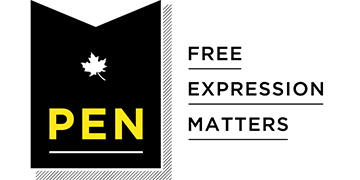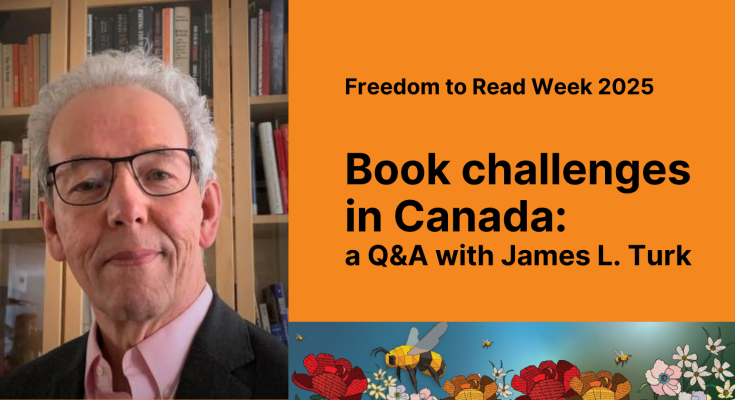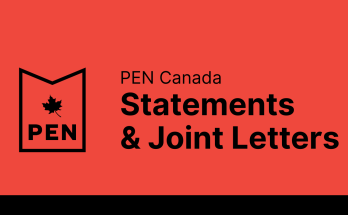Freedom to Read Week is an annual event that encourages Canadians to think about and reaffirm their commitment to intellectual freedom, whether you are a librarian, bookseller, educator, student, or member of the community.
To celebrate the week, PEN Canada is co-sponsoring a Centre for Free Expression online event on censorship in Canadian schools and libraries this week on Wednesday February 26.
Ahead of Wednesday’s event, we asked James L. Turk (Director, Centre for Free Expression) about the climate of book challenges in Canada.
PEN Canada: Book challenges are on the rise around the globe, including Belarus, China, Hungary, Turkiye, and even in Canada. Perhaps for Canadians this is most noticeable south of our border. To what extent is the current intolerance of books driven by the cultural polarization that has engulfed US politics in recent years?
James L. Turk: The rise in attempts to censor books is both a cause and an effect of the growing cultural polarization. Attacking books about sex education, sexual orientation and gender identity, anti-racism, or because they are LGBTQ2s+ positive are attempts by some on the right to create and heighten a cultural and political divide. The often-enthusiastic embrace of these attempts by various sections of the population makes the divide real.
Do you think book challengers are sincerely concerned about “critical race theory” and “parental rights”, or are these figleaves for other agendas?
They are both. For the ideological right, attacking “critical race theory,” which is really an attack on any notion of systemic racism, and the championing of “parental rights” are means of building and motivating a base of supporters. That works in part because many people are in denial about the systemic racism still rampant in our society, and many parents are worried about the modern world and long for a never-existent “Golden Age” where “children were children”, respected their parents, and did what they were told.
Marginalized writers and communities often speak about their voices being “erased” by book bans and challenges. There is evidence that challenges have a disproportionate effect on emerging/racialized/minority authors, with many withdrawing challenged books or not writing any others, and publishers choosing to avoid ‘controversial’ topics. Should we be more concerned about books that never get published, or written?
The good news in Canada is that while challenges are increasing, very few books are banned. Often, attempts to have a book banned result in a significant increase in readership of the book. There is little indication of publishers avoiding “controversial” subjects like sexual orientation and gender diversity, sex education for children and young adults, or racism. In fact, we are seeing more of these books than ever. While it is always difficult for new writers to get published, we are seeing a greater diversity in authors, too.
What role have social media platforms played in provoking and amplifying book challenges? Do they also have a role to play in organizing resistance to them?
Social media platforms have played a significant role as tools in spreading and intensifying the culture wars. Social media platforms are the principal means of disseminating to every corner of the world the actions by governments (Florida is a prime example) and by well-funded organizations (like Moms for Liberty) that demand censorship of books. In Canada, many of those calling for the removal of books in libraries and schools have not even read the books but “know” about them through social media.
In 2022 Bookriot estimated that the median number of books read per year by a Canadian is 17, and 12 for an American. With such low numbers, what future do you think printed books will play in an ever more crowded and contentious infotainment ecosystem?
I remember the predictions two decades ago that printed books, bookstores, and public libraries would soon be things of the past in the rapidly developing digital age. They have been proven wrong. The most recent data I have seen show that the sales of books over the past decade has been remarkably stable. A survey on book readership found approximately 33 per cent of Canadians read a book every day, with 49 per cent reporting they will read a book once a week. A survey of Canadian public library users found that 70% of prefer print books, compared to 17% who prefer ebooks, 9% who prefer audiobooks, and 5% who have no preferred book format.
Which challenged books have you most enjoyed reading? When was the last time that a book changed your mind about something significant?
There are so many wonderful books that appear on the most challenged lists. Ones I have enjoyed reading include The Kite Runner by Khaled Hosseini, The Color Purple by Alice Walker, Huckleberry Finn by Mark Twain, Catcher in the Rye by J. D. Salinger, 1984 by George Orwell; Nickle and Dimed by Barbara Ehrenreich, and Slaughterhouse Five by Kurt Vonnegut. A book I just read recently by Osgoode Hall law professor Allan C. Hutchinson, Democracy and Constitutions made me rethink my view that constitutions are foundational of democracy and, may, in fact, serve to protect elites from democratic control.




